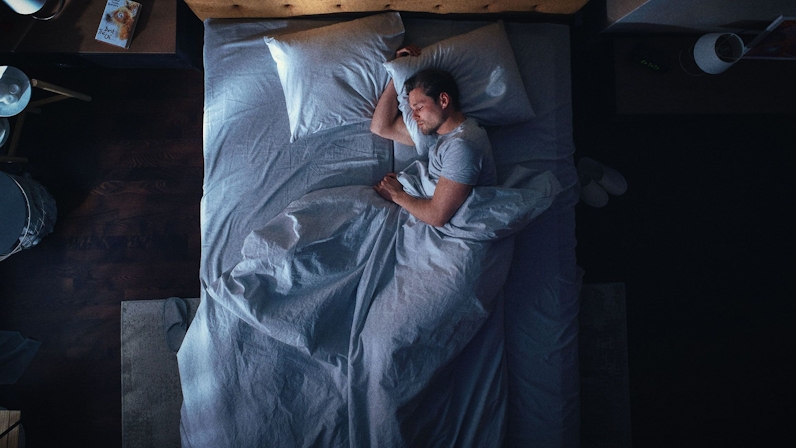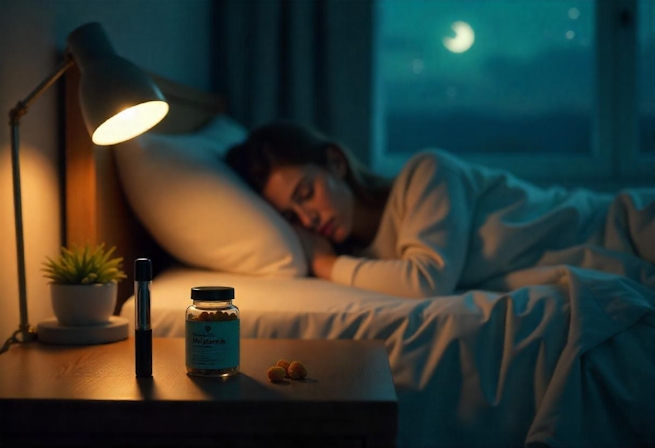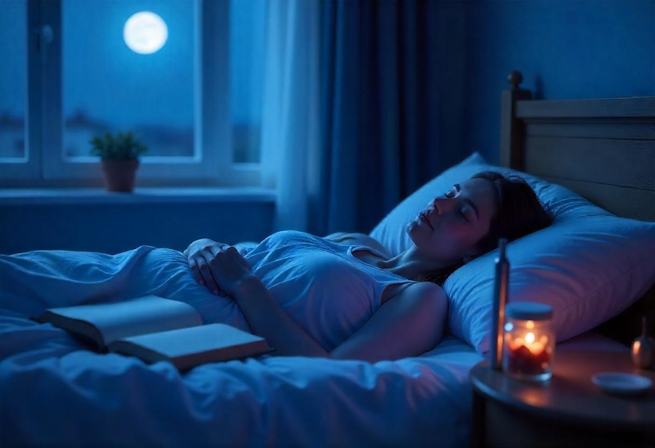
Kalegin / Unsplash
Melatonin And Weed: Are They Safe To Mix Before Bed?
How melatonin and cannabis affect sleep—alone and together.
About 70 million adults in the United States experience a sleep disorder, and nearly one in three aren’t getting the recommended seven hours of sleep each night.
As sleep problems become more widespread, many people are looking for alternatives to traditional prescription medications. Natural options like melatonin and cannabis have gained attention for their potential to promote better sleep, but they work in very different ways, and combining them isn’t always as simple as it seems.
Before exploring how they interact, let’s first take a closer look at how melatonin and cannabis each affect sleep on their own.
How Melatonin Affects Sleep Alone

Melatonin, often dubbed the “sleep hormone,” is a natural chemical produced by the pineal gland in the brain. Its primary role is to regulate the body’s circadian rhythm — the body’s internal system that manages sleep and wake cycles based on light and darkness.
As the sun sets and light levels drop, melatonin levels rise, signaling to the body that it’s time to sleep. By morning, melatonin levels decline, which cues wakefulness.
Whether produced naturally or taken as a supplement, melatonin plays a role in sleep regulation, but supplements are particularly used for specific situations, such as:
- Helping people fall asleep faster or stay asleep longer
- Resetting the body’s internal clock after travel (jet lag) or shift work
- Supporting management of certain sleep disorders, like insomnia or Non-24-Hour Sleep-Wake Disorder, often as part of broader treatment plans
The average melatonin dose for adults is typically 1 to 5 mg, which is taken about 30 minutes to 2 hours before bedtime.
Pros And Cons Of Using Melatonin For Sleep
Pros:
- Helps regulate the sleep-wake cycle and circadian rhythms
- Easily accessible as an over-the-counter supplement
- Can help restore balance to disrupted sleep patterns
- Non-addictive alternative to prescription sleep aids
- Generally considered safe at recommended doses
- May support overall sleep quality
- Natural hormone already produced by your body
- Supported by evidence for improving sleep onset in some types of insomnia
- Typically causes less next-day grogginess compared to some prescription sleep aids
Cons:
- Possible nausea at higher doses
- Limited research on long-term safety
- Mixed effectiveness among different users
- May disrupt hormone balance in some individuals
- May cause dizziness and/or headaches
- Can reduce natural melatonin production with regular use
- Can lead to morning grogginess and difficulty concentrating
- Not recommended for long-term use without medical supervision
- Could mask underlying sleep disorders that need medical attention
- Potential interactions when mixing melatonin with weed, alcohol, or other substances
How Weed Affects Sleep Alone

Annie Spratt / Unsplash
Cannabis has long been used to help people fall asleep faster and stay asleep longer. But how exactly does it work?
The key active compounds, called cannabinoids, in cannabis — THC (tetrahydrocannabinol), CBD (cannabidiol), and CBN (cannabinol) — interact with the body’s endocannabinoid system, which plays a role in regulating sleep, mood, and appetite.
Here’s how cannabis may affect sleep:
- THC is primarily responsible for the drowsy, sedative effect many people associate with nighttime cannabis use. It may help users fall asleep faster, especially at lower doses, although higher doses can sometimes increase anxiety.
- CBD is non-intoxicating and may help reduce anxiety, which can make it easier to fall and stay asleep. Some studies suggest CBD may also improve sleep quality by promoting more restful sleep cycles.
- CBN is a cannabinoid that forms as THC ages. Early research indicates that CBN may have additional sedative properties, although more studies are needed to confirm its effectiveness for sleep.
Some studies have found that cannabis can help users enter deep sleep, the stage most important for physical restoration, more quickly. However, it may also reduce the amount of time spent in REM sleep, the stage associated with dreaming and memory consolidation. In some cases, THC might even stimulate melatonin production, although this connection needs more research.
Several cannabis strains are often recommended for sleep thanks to their indica-heavy genetics, which promote full-body relaxation and sedation:
Pros and Cons of Using Weed For Sleep
Pros
- May be beneficial for infrequent or chronic insomnia
- Potential benefits for those with pain-related sleep issues
- Powerful sedative effects that help users fall asleep faster
- May help reset disrupted circadian rhythms for some individuals
- Many medical cannabis patients report improved deep sleep quality
- Anecdotal reports suggest effectiveness for specific sleep disorders
- THC and other cannabinoids can help calm an overactive brain at night
- Available by prescription in many states where medical marijuana is legal
- Growing research supports its use for certain sleep-wake cycle disturbances
- Some users experience longer sleep duration compared to melatonin supplements
Cons
- May negatively affect melatonin secretion
- Can inhibit REM sleep, potentially affecting memory
- Risk of developing psychological dependence or addiction
- Smoking weed before bed can cause drowsiness the next day
- Regular marijuana use may lead to tolerance, requiring higher doses
- Withdrawal may temporarily worsen insomnia once you stop using it
- Limited consistent, high-quality evidence on long-term safety for sleep
- Legal access remains restricted in many states despite growing acceptance
- Adverse side effects include dizziness, confusion, and impaired motor coordination
- Mixing cannabis with alcohol or melatonin can amplify sedative effects dangerously
- Relationship between cannabis use and overall sleep cycle balance needs more research
- THC (tetrahydrocannabinol) can increase anxiety in some users, counteracting sleep benefits
Mixing Melatonin And Weed: A Power Duo Or Risky Combo?

Freepik / Herb
Finally, let’s answer the question that brought you to this article: Can you mix melatonin and weed? Is mixing melatonin and weed safe?
At this time, there is very limited research on how melatonin and cannabis interact directly. Most of what’s known comes from individual reports rather than clinical studies. While it’s possible to combine melatonin and cannabis, the effects and risks can vary depending on how much you use, along with individual factors like metabolism and tolerance.
Both melatonin and cannabis can promote sleep by acting on the brain’s natural sleep-wake pathways. Melatonin works by reinforcing your circadian rhythm, while cannabis, particularly strains high in THC, can have strong sedative effects. Together, they might enhance sleepiness and help some people fall asleep faster or stay asleep longer.
However, combining them may also increase the chances of unwanted side effects, such as:
- Excessive drowsiness the next day
- Morning grogginess and trouble concentrating
- Dizziness or lightheadedness
- Altered REM sleep patterns
Another concern is that frequent cannabis use may interfere with your body’s natural melatonin production over time, potentially making it harder to fall asleep with depending on sleeping aids like cannabis.
If you’re considering using both, it’s best to start with low doses, avoid combining them with other sedating substances like alcohol, and talk with a healthcare provider — especially if you have existing sleep issues or take other medications.
THC Vs Melatonin: Which Is Better For Sleep?

Greg Pappas / Unsplash
Choosing between melatonin and cannabis for sleep depends largely on your personal needs and health history.
Melatonin supplements work with your body’s natural hormone production to regulate sleep-wake cycles and circadian rhythms. They’re easy to find at your local drugstore, and they’re non-intoxicating. They also support natural REM sleep patterns, unlike cannabis. However, for some, melatonin can cause next-day grogginess or have only mild effects, depending on the dose and timing.
On the other hand, cannabis offers potent sedative effects that may be more helpful for certain conditions like chronic pain or severe insomnia. benefit those with chronic insomnia or pain-related sleep disorders. Many users find that cannabis helps them fall asleep faster. That said, regular THC use can reduce REM sleep quality and, over time, may disrupt overall sleep patterns if used heavily.
Keep these notes in mind:
- Melatonin: Often better for occasional sleep difficulties, jet lag, or helping reset circadian rhythms.
- THC: May be more effective for sleep issues caused by pain, anxiety, or when other methods haven’t worked.
Have some more questions? See our FAQ section below.
Melatonin And Weed: FAQ

Freepik / Herb
Is melatonin like weed?
Melatonin is a natural hormone your body produces in the brain to help regulate sleep, and it’s also available as an over-the-counter (OTC) supplement. Weed, on the other hand, is a psychoactive plant that affects the brain in much broader ways. While melatonin mainly influences your sleep cycle, cannabis contains compounds like THC that alter mood, perception, and physical sensations. Plus, weed is still federally illegal in the U.S., though many states have legalized it for medical or recreational use.
Does weed contain melatonin?
No, cannabis plants don’t contain melatonin. Weed naturally produces compounds like cannabinoids, terpenes, and flavonoids.
Does weed produce melatonin?
There is not enough research to support the claim that THC produces melatonin, however, THC may affect natural melatonin secretion patterns in the body. When first used, THC might suppress melatonin production and secretion. As the effects of THC wear off, melatonin levels may rebound, which could help explain why people often feel extra tired during the comedown.
What are the best weed strains for sleep?
Indica-dominant cannabis strains like Northern Lights, Granddaddy Purple, and Bubba Kush are widely sought after for their sleep-enhancing effects.
Are mixing melatonin and edibles safer than smoking?
Not necessarily. While avoiding smoke is healthier for the lungs, combining edibles with melatonin could cause unpredictable or intensified sedative effects.
Herb Recommended Products:
READ MORE










